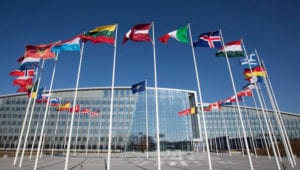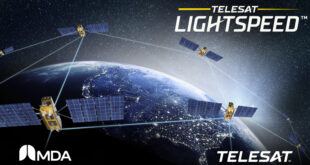
The North Atlantic Treaty Organisation (NATO) is expected to approve its first space strategy this coming week, and NATO leaders will apparently acknowledge that space is a warfighting domain at the NATO summit to be held in London in December 2019, according to reports by Reuters and the Financial Times.
Both the NATO space strategy and political designation of space as a warfighting domain will reportedly trigger a formal debate and process within the military alliance about how best it can address the growing space threat environment, particularly threats attributed to China and Russia. The developments also open up the possibility of NATO taking on space operations for the purposes of space control and denial during a conflict where a member-state has invoked Article 5 of the NATO Treaty, obligating other members to come to the defence of that state.
“You can have warfare exclusively in space, but whoever controls space also controls what happens on land, on the sea and in the air…[I]f you don’t control space, you don’t control the other domains either,” said Jamie Shea, a former NATO official now with the Friends of Europe think-tank, quoted by Reuters.
While NATO is set to release a space strategy, and recognise space as a warfighting domain later this year, there are no immediate plans to declare space as an operational domain for NATO operations, something that would require the organisation to establish budgets, organisational entities, and capability for, as well as doctrines and formal policies.
These developments, however, are significant for NATO as it has long wrestled with how it should deal with national security and military space issues as an alliance, with the long-standing political preference to leave the matter to individual member-states, particularly the United States, as well as Canada, France, Germany, Italy, and the United Kingdom.
“What we are looking towards is to bring space firmly on to the agenda at NATO. What the environment is, what the threats are…It is about understanding how things in space interact with what is on Earth — and understanding what resilience we would need to mitigate that,” said a NATO member-state diplomat quoted anonymously in the Financial Times.
The NATO space strategy expected to be approved this week will likely look to address issues such as how the alliance can use existing and planned member-state and commercial space assets rather than acquiring satellites for exclusive use by NATO.
There is increasing acknowledgement among most NATO member-states that warfighting in all traditional domains is dependent upon satellite systems, and that these are becoming more vulnerable to a range of counterspace capabilities believed to be developed by countries such as Russia and China.
NATO’s foray into space seems to be politically motivated by both criticism of European member-state defence spending by President Donald J. Trump, as well as the establishment of a U.S. Space Force or U.S. Space Corps by the Trump administration. NATO space efforts will not necessarily be straightforward, however, as some member-states such as France place a political premium on strategic autonomy in domains such as space, while finding a common operational NATO response to counterspace threats will be politically challenging.





